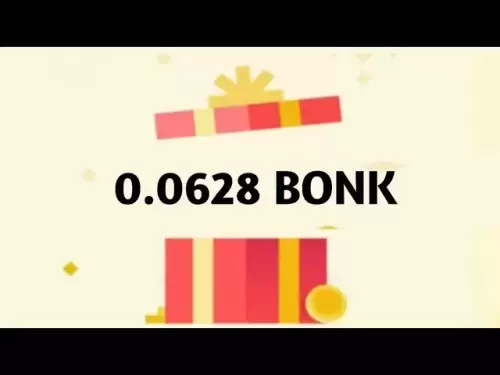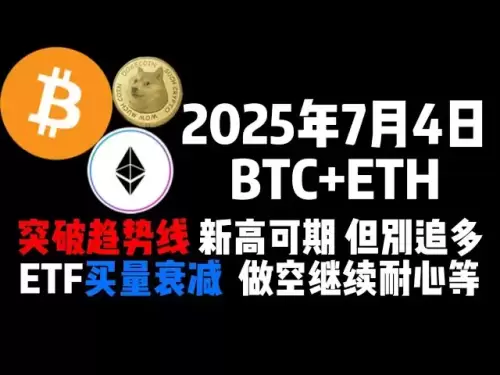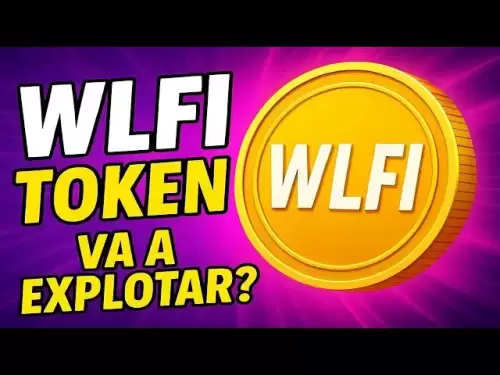-
 Bitcoin
Bitcoin $107,758.1435
-1.45% -
 Ethereum
Ethereum $2,490.6114
-3.32% -
 Tether USDt
Tether USDt $1.0004
0.00% -
 XRP
XRP $2.2042
-2.04% -
 BNB
BNB $651.4818
-1.12% -
 Solana
Solana $145.8782
-3.02% -
 USDC
USDC $0.9999
0.00% -
 TRON
TRON $0.2819
-1.39% -
 Dogecoin
Dogecoin $0.1621
-4.58% -
 Cardano
Cardano $0.5658
-4.18% -
 Hyperliquid
Hyperliquid $37.8181
-6.63% -
 Sui
Sui $2.8404
-4.91% -
 Bitcoin Cash
Bitcoin Cash $481.3703
-2.30% -
 Chainlink
Chainlink $13.0043
-4.79% -
 UNUS SED LEO
UNUS SED LEO $9.0464
0.26% -
 Avalanche
Avalanche $17.6115
-4.39% -
 Stellar
Stellar $0.2359
-2.11% -
 Toncoin
Toncoin $2.7507
-3.93% -
 Shiba Inu
Shiba Inu $0.0...01126
-4.41% -
 Litecoin
Litecoin $86.1256
-3.27% -
 Hedera
Hedera $0.1530
-3.13% -
 Monero
Monero $312.7785
-2.81% -
 Dai
Dai $1.0000
-0.01% -
 Ethena USDe
Ethena USDe $1.0001
-0.02% -
 Polkadot
Polkadot $3.3287
-5.55% -
 Bitget Token
Bitget Token $4.3840
-4.00% -
 Uniswap
Uniswap $6.8370
-10.63% -
 Pepe
Pepe $0.0...09548
-4.25% -
 Aave
Aave $260.2526
-6.11% -
 Pi
Pi $0.4658
-5.45%
How to prevent Ethereum wallets from being deceived by fake exchanges?
Protect your Ethereum by researching exchanges thoroughly, verifying security measures (2FA, cold storage), using secure deposit/withdrawal methods, and reporting suspicious activity to authorities. Avoid unrealistic returns and unprofessional websites.
Mar 17, 2025 at 09:00 pm
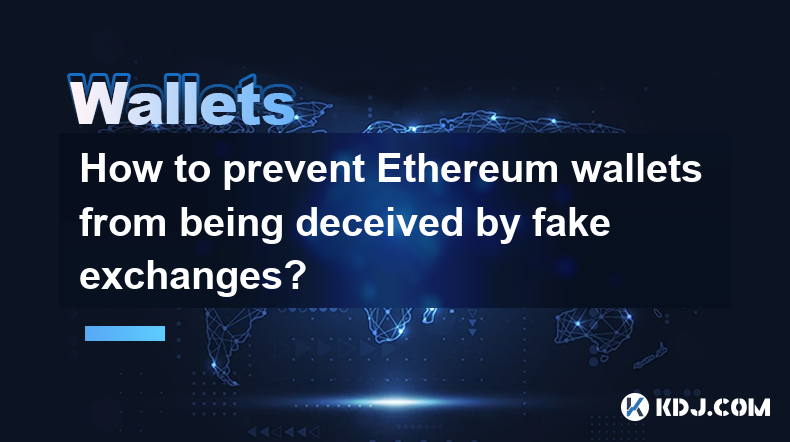
Key Points:
- Understanding the characteristics of legitimate Ethereum exchanges.
- Identifying red flags of fraudulent exchanges.
- Verifying the security measures employed by exchanges.
- Utilizing secure methods for depositing and withdrawing Ethereum.
- Reporting suspicious activity to relevant authorities.
How to Prevent Ethereum Wallets from Being Deceived by Fake Exchanges?
The cryptocurrency landscape, especially Ethereum, is rife with fraudulent exchanges designed to steal users' funds. Protecting your Ethereum wallet requires vigilance and a thorough understanding of how these scams operate. This article outlines crucial steps to avoid falling victim to such schemes.
Recognizing Legitimate Ethereum Exchanges:
Before entrusting your Ethereum to any exchange, thorough research is paramount. Legitimate exchanges typically have a long operational history, verifiable contact information, and a robust online presence with positive user reviews. Check for regulatory compliance and security certifications. Look for transparency in their fee structures and operational processes. Avoid exchanges with overly-promising returns or those lacking detailed information.
Identifying Red Flags of Fraudulent Exchanges:
Numerous red flags signal a potentially fraudulent exchange. These include unprofessional websites with poor design, missing or incomplete contact information, and a lack of transparency about their operations. Be wary of exchanges offering unrealistically high returns or those lacking proper security measures like two-factor authentication (2FA). Also, be cautious of exchanges with overwhelmingly positive reviews from unknown sources, as these may be fabricated.
Verifying Exchange Security Measures:
A secure exchange employs robust security protocols to protect user funds. Look for features like cold storage for a significant portion of their assets, regular security audits, and insurance policies to cover potential losses. Two-factor authentication (2FA) is essential; it adds an extra layer of protection against unauthorized access. Investigate the exchange's history for any reported security breaches or incidents. A lack of these security features is a major red flag.
Secure Deposit and Withdrawal Methods:
When depositing Ethereum, double-check the exchange's provided address multiple times. A single typo can lead to irreversible loss of funds. Avoid using public Wi-Fi or unsecured networks when accessing your exchange account. Enable 2FA on your exchange account and your Ethereum wallet. For withdrawals, only use the exchange's officially provided withdrawal addresses. Never share your private keys or seed phrases with anyone, including exchange representatives.
Reporting Suspicious Activity:
If you encounter a suspicious exchange or believe you've been targeted by a scam, report it immediately. Contact the relevant authorities, such as your local law enforcement or the appropriate regulatory bodies. Additionally, report the suspicious activity to online platforms where the exchange is advertised or discussed. Sharing your experience can help warn others and prevent further victimization. Document all interactions with the exchange, including screenshots and transaction details.
Utilizing Reputable Ethereum Wallets:
Choosing a secure wallet is equally critical. Hardware wallets offer the highest level of security, storing your private keys offline. Software wallets, while convenient, require strong passwords and regular security updates. Avoid using online wallets or exchanges as your primary storage solution, as these are more vulnerable to hacking. Regularly back up your wallet and keep your seed phrase secure.
Understanding Smart Contract Risks:
Many scams involve malicious smart contracts. Before interacting with any smart contract, carefully review its code and ensure it's legitimate. Avoid contracts with unclear purposes or those promising unrealistic returns. Use reputable tools to analyze the code and assess potential risks. Consult with experienced developers if you are unsure about the contract's safety.
The Importance of Due Diligence:
Thorough due diligence is paramount. Don't rush into using an exchange without proper research. Take your time to verify the exchange's legitimacy, security measures, and user reviews. Remember, if something seems too good to be true, it probably is. Your vigilance is the best defense against fraudulent exchanges.
Avoiding Phishing Attempts:
Phishing scams are prevalent in the cryptocurrency world. Be wary of unsolicited emails, messages, or phone calls claiming to be from a legitimate exchange. Never click on links from unknown sources or provide your private keys or seed phrase to anyone. Legitimate exchanges will never ask for this information. Verify the authenticity of any communication before responding.
Frequently Asked Questions:
Q: How can I verify if an Ethereum exchange is legitimate?
A: Look for verifiable contact information, a long operational history, positive user reviews on reputable platforms, and regulatory compliance. Check for security measures like two-factor authentication and cold storage.
Q: What should I do if I suspect an exchange is fraudulent?
A: Avoid using the exchange. Report it to the relevant authorities and online platforms. Document all interactions and share your experience to warn others.
Q: How can I protect my Ethereum wallet from phishing attacks?
A: Never click on suspicious links, be wary of unsolicited communications, and verify the authenticity of any contact before providing any personal information. Legitimate exchanges will never ask for your private keys.
Q: What are the key security features to look for in an Ethereum exchange?
A: Two-factor authentication (2FA), cold storage of assets, regular security audits, insurance policies, and transparent security practices are all crucial.
Q: What should I do if I've already sent Ethereum to a fraudulent exchange?
A: Contact law enforcement immediately. Document all transactions and gather any evidence you can. The chances of recovering funds are low, but reporting the incident is crucial.
Q: Are all decentralized exchanges (DEXs) safe?
A: No. While DEXs generally offer more anonymity and decentralization, they can still be vulnerable to scams and exploits. Always research the DEX carefully and understand the associated risks. Review the smart contract code if possible.
Disclaimer:info@kdj.com
The information provided is not trading advice. kdj.com does not assume any responsibility for any investments made based on the information provided in this article. Cryptocurrencies are highly volatile and it is highly recommended that you invest with caution after thorough research!
If you believe that the content used on this website infringes your copyright, please contact us immediately (info@kdj.com) and we will delete it promptly.
- Bitcoin's Pattern Break: Are HODLers the Key to the Next Surge?
- 2025-07-04 18:50:12
- Bitcoin Price, Trump's Bill, and the $150K Dream: A NYC Take
- 2025-07-04 19:50:12
- Ethereum, LILPEPE, and the July Bounce: Will Pepe Steal ETH's Thunder?
- 2025-07-04 19:10:12
- Binance Institutional Loans: Unlocking 4x Leverage and Zero Interest for Whales
- 2025-07-04 19:15:12
- Bitcoin Bull Run: Analysts Eye Peak in Late 2025?
- 2025-07-04 19:20:13
- Pepe Indicators, Bullish Forecast: Can the Meme Coin Rally?
- 2025-07-04 19:25:12
Related knowledge

How to cancel a pending transaction in Phantom wallet?
Jul 03,2025 at 07:21pm
Understanding Pending Transactions in Phantom WalletA pending transaction in the Phantom wallet occurs when a user initiates a transfer or interaction with the Solana blockchain, but it hasn't yet been confirmed by the network. This can happen due to various reasons such as low transaction fees, network congestion, or incorrect gas settings. It's import...

How to see the estimated value of my tokens in Phantom wallet?
Jul 04,2025 at 12:21am
What is Phantom Wallet?Phantom wallet is one of the most popular cryptocurrency wallets designed for the Solana blockchain. It allows users to store, send, receive, and manage various tokens built on Solana, including SPL tokens and NFTs. The wallet offers a user-friendly interface, making it accessible for both beginners and advanced users in the crypt...

How to lock my Phantom wallet extension?
Jul 03,2025 at 11:14am
What Is the Phantom Wallet and Why Lock It?The Phantom wallet is a popular non-custodial cryptocurrency wallet designed for interacting with the Solana blockchain. Supporting both browser extensions and mobile apps, Phantom allows users to store, send, receive, and stake SOL tokens, as well as interact with decentralized applications (dApps). Securing y...

Does Phantom wallet offer two-factor authentication (2FA)?
Jul 03,2025 at 09:00am
Understanding Phantom Wallet and Its Security FeaturesPhantom wallet is a widely used non-custodial cryptocurrency wallet that supports the Solana blockchain. It allows users to store, send, receive, and interact with decentralized applications (dApps) seamlessly. As security is a top priority for any crypto wallet user, security features like two-facto...

What is "rent" on Solana and how does it affect my Phantom wallet?
Jul 02,2025 at 08:35pm
Understanding 'Rent' on SolanaIn the context of Solana, the term 'rent' refers to a storage fee that users pay for maintaining data on the blockchain. Unlike Ethereum, where storage costs are paid once via gas fees during contract deployment, Solana implements a recurring cost model to ensure efficient usage of network resources. This means that any acc...
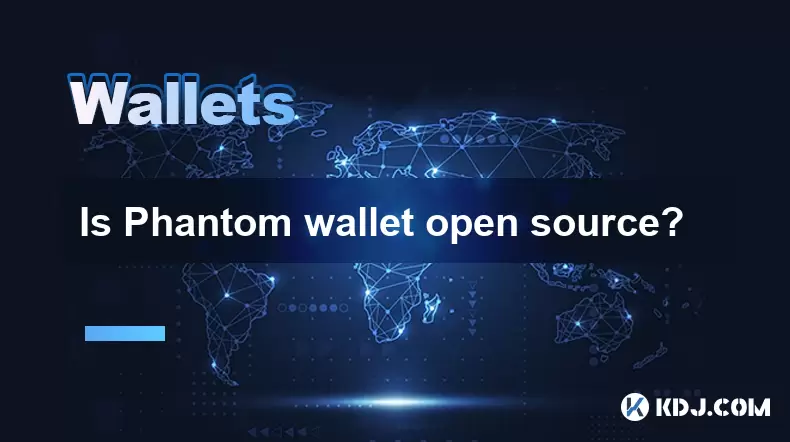
Is Phantom wallet open source?
Jul 03,2025 at 12:29am
What is Phantom Wallet?Phantom wallet is a non-custodial cryptocurrency wallet primarily designed for the Solana blockchain. It allows users to store, send, receive, and interact with decentralized applications (dApps) on the Solana network. The wallet is available as a browser extension and mobile application, offering a seamless experience for both be...

How to cancel a pending transaction in Phantom wallet?
Jul 03,2025 at 07:21pm
Understanding Pending Transactions in Phantom WalletA pending transaction in the Phantom wallet occurs when a user initiates a transfer or interaction with the Solana blockchain, but it hasn't yet been confirmed by the network. This can happen due to various reasons such as low transaction fees, network congestion, or incorrect gas settings. It's import...

How to see the estimated value of my tokens in Phantom wallet?
Jul 04,2025 at 12:21am
What is Phantom Wallet?Phantom wallet is one of the most popular cryptocurrency wallets designed for the Solana blockchain. It allows users to store, send, receive, and manage various tokens built on Solana, including SPL tokens and NFTs. The wallet offers a user-friendly interface, making it accessible for both beginners and advanced users in the crypt...

How to lock my Phantom wallet extension?
Jul 03,2025 at 11:14am
What Is the Phantom Wallet and Why Lock It?The Phantom wallet is a popular non-custodial cryptocurrency wallet designed for interacting with the Solana blockchain. Supporting both browser extensions and mobile apps, Phantom allows users to store, send, receive, and stake SOL tokens, as well as interact with decentralized applications (dApps). Securing y...

Does Phantom wallet offer two-factor authentication (2FA)?
Jul 03,2025 at 09:00am
Understanding Phantom Wallet and Its Security FeaturesPhantom wallet is a widely used non-custodial cryptocurrency wallet that supports the Solana blockchain. It allows users to store, send, receive, and interact with decentralized applications (dApps) seamlessly. As security is a top priority for any crypto wallet user, security features like two-facto...

What is "rent" on Solana and how does it affect my Phantom wallet?
Jul 02,2025 at 08:35pm
Understanding 'Rent' on SolanaIn the context of Solana, the term 'rent' refers to a storage fee that users pay for maintaining data on the blockchain. Unlike Ethereum, where storage costs are paid once via gas fees during contract deployment, Solana implements a recurring cost model to ensure efficient usage of network resources. This means that any acc...

Is Phantom wallet open source?
Jul 03,2025 at 12:29am
What is Phantom Wallet?Phantom wallet is a non-custodial cryptocurrency wallet primarily designed for the Solana blockchain. It allows users to store, send, receive, and interact with decentralized applications (dApps) on the Solana network. The wallet is available as a browser extension and mobile application, offering a seamless experience for both be...
See all articles























